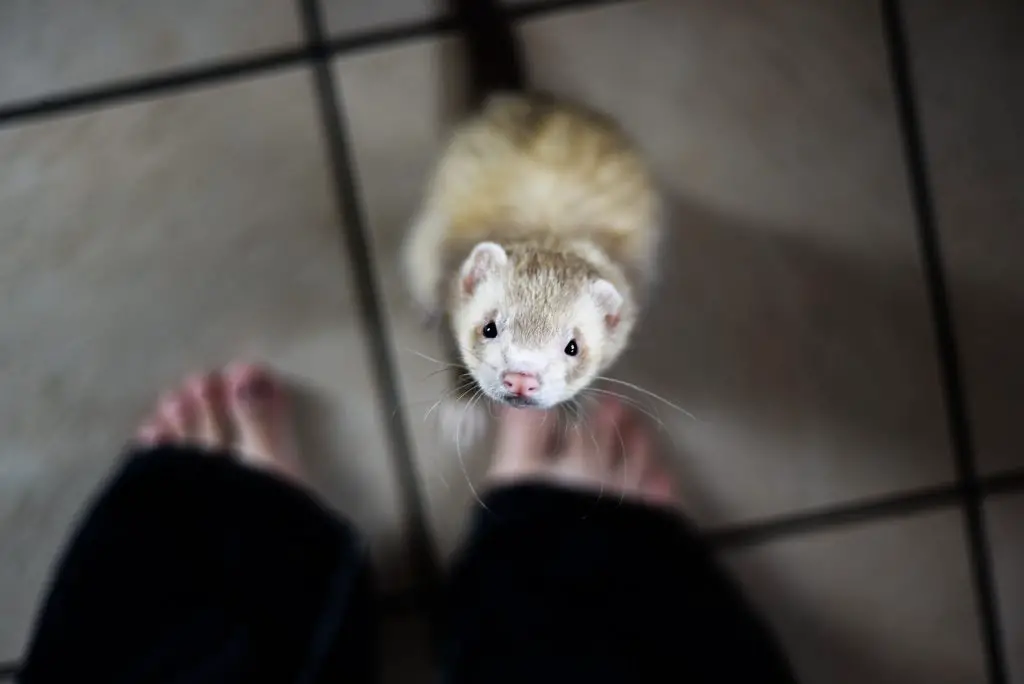Ferrets are active creatures with voracious appetites—they eat up to 7% of their body weight every day! They need a high protein diet, which you can find in ferret food or supplement with meat like chicken and lamb.
But can ferrets take their protein requirements from non-meat sources? Can ferrets eat almonds and other kinds of nuts? You may think, “Nuts are very high in nutrition and are often used as “natural treats” for other pets. It wouldn’t hurt to give it to them as a snack.”
However, just because a food is good for humans and other animals, don’t assume that it’s safe to feed your pet. They may find it difficult to digest it, or it may contain compounds that could cause an imbalance in their diet.
We ask animal experts and veterinarians: are almonds poisonous to ferrets? What about almond-based products, like almond milk or almond butter?
Can ferrets eat whole almonds?
Ferrets are strict carnivores. Their digestive systems can’t process food that is high in carbohydrates and fiber.
However, a small handful (or 1 ounce) of almonds contains 2.5 grams of carbohydrates and 3.5 grams of fiber. So even if almonds are high in protein, they will have trouble breaking down and absorbing the other nutrients.
Since they can’t digest the almonds, there’s also a high chance that they will experience constipation and stomach pain, or even worse, intestinal blocks.
Can ferrets have almond milk?
There’s a lot of conflicting information on the internet about whether or not it’s safe to give ferrets dairy and milk products.
Some pet forums claim that it’s okay to give small amounts of milk to ferrets—there are even owners who proudly say that their ferrets love soy milk or almond milk.
However, veterinarians and credible pet authorities say that you should never give ferrets any form of dairy. They lack the enzymes that can help break down dairy products. Cow’s milk, soy milk, and almond milk may cause diarrhea, and consequently, dehydration.
Only baby ferrets need milk, which they will get from their mothers until they are weaned. If you are in a situation where you are rescuing or adopting a ferret who has been orphaned or weaned too early, ask your veterinarian about a safe milk substitute.
Can ferrets eat almond butter or almond pastries?
Do not give ferrets any nut butters. Aside from the fact that they can’t digest almonds and almond products well, these butters contain a lot of sugar, oil, and other preservatives.
Even low-sugar butters or pastries can be toxic to ferrets. These may use sugar substitutes like Xylitol, which can be poisonous to pets.
What do I do if my ferret accidentally eats almonds?
Ferrets are curious creatures and love to nibble at any food they find lying around. Before you know it, they may steal a bite of your cereal and trail mix, or the almond cookies you left out on the cookie sheet. Should you panic?
It depends on how many almonds your ferret was able to eat. Was it a whole almond, and how many pieces? Or were there small bits of almond mixed with other ingredients? Was it almond milk?
Whole, large pieces of almonds are more problematic. You may want to call your veterinarian, especially if your ferret ate a lot of pieces.
If your ferret only ate or drank a small amount, don’t panic. While ferrets can’t digest almonds well, they aren’t toxic or poisonous to them. They may experience some discomfort, but not enough to merit an emergency run to the vet.
However, monitor your ferret for any signs of pain. If he is unable to eat or drink, is visibly less active, or shows signs of stress (such as increased irritability or aggression), call your vet.
What are safer alternatives to almonds?
If you wish to give your ferrets a natural, high-protein snack, veterinarians recommend giving cooked pieces of meat, or fresh raw meaty bones.
The bones should be large enough so your pet can’t swallow it whole or break it into two, which can be a choking hazard. For the same reason, don’t give cooked bones because they are soft enough to splinter when chewed or gnawed.
Since it’s difficult to find ferret treats, you may try occasionally giving high-grade kitten food, kibble, or cat treats. They may also like baby food, which is specially processed for easy digestion.
Don’t go “nuts” with the snacks and treats
As responsible pet owners, we need to give our ferrets the right food, in the right amounts, and at the right time.
While it’s okay to give them snacks, know what kind of food they can eat, and avoid unhealthy or toxic food like almonds and nuts.
However, even healthy, ferret-safe treats should only compose about 10% of your pet’s diet. Constant snacking can affect their appetite, so they will eat less of the real food that they need for proper health and growth.
Also, ferrets are very intelligent and can be quite stubborn. If they get used to the stronger flavors of junk food and snacks, they may refuse to eat the food and then convince you to feed them something else. It’s hard to say no to them with their big eyes and adorable antics—and they know that, and will play that to their advantage!
References:

